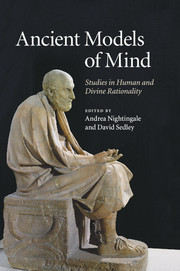Book contents
- Frontmatter
- Contents
- List of contributors
- Introduction
- 1 Plato on aporia and self-knowledge
- 2 Cross-examining happiness: reason and community in Plato's Socratic dialogues
- 3 Inspiration, recollection, and mimēsis in Plato's Phaedrus
- 4 Plato's Theaetetus as an ethical dialogue
- 5 Contemplating divine mind
- 6 Aristotle and the history of skepticism
- 7 Stoic selection: objects, actions, and agents
- 8 Beauty and its relation to goodness in Stoicism
- 9 How dialectical was Stoic dialectic?
- 10 Socrates speaks in Seneca, De vita beata 24–28
- 11 Seneca's Platonism: the soul and its divine origin
- 12 The status of the individual in Plotinus
- A. A. Long: publications 1963–2009
- Bibliography
- Index
Introduction
Published online by Cambridge University Press: 06 December 2010
- Frontmatter
- Contents
- List of contributors
- Introduction
- 1 Plato on aporia and self-knowledge
- 2 Cross-examining happiness: reason and community in Plato's Socratic dialogues
- 3 Inspiration, recollection, and mimēsis in Plato's Phaedrus
- 4 Plato's Theaetetus as an ethical dialogue
- 5 Contemplating divine mind
- 6 Aristotle and the history of skepticism
- 7 Stoic selection: objects, actions, and agents
- 8 Beauty and its relation to goodness in Stoicism
- 9 How dialectical was Stoic dialectic?
- 10 Socrates speaks in Seneca, De vita beata 24–28
- 11 Seneca's Platonism: the soul and its divine origin
- 12 The status of the individual in Plotinus
- A. A. Long: publications 1963–2009
- Bibliography
- Index
Summary
This book started life at a conference which its two editors organized to honour Tony Long, better known to the world of scholarship as A. A. Long. It was held at his own university, the University of California, Berkeley, in September 2007, to mark his 70th birthday. “Models of Mind” was known to us as the working title of a long-term project of Long's own, and seemed to us to capture a theme that has, more than any other, been the hallmark of his truly seminal contribution to the study of ancient philosophy over four decades and more.
Tony Long was born in England in 1937. Since 1991 he has been Irving Stone Professor of Literature in the Department of Classics at Berkeley, where he is also an affiliated professor in the departments of Philosophy and Rhetoric. But his education and the first part of his professional career were set elsewhere. He took his BA and PhD degrees at University College London. There, among many leading scholars who taught and influenced him, special mention must be made here of David Furley, whose exceptional incisiveness and intellectual clarity in the study of ancient philosophy clearly passed from teacher to pupil. However, Long was not yet specializing in ancient philosophy, and his doctoral thesis (completed in 1964 under T. B. L. Webster) was in fact on Sophocles, later becoming the basis of his highly regarded 1968 book Language and Thought in Sophocles: A Study of Abstract Nouns and Poetic Technique.
- Type
- Chapter
- Information
- Ancient Models of MindStudies in Human and Divine Rationality, pp. 1 - 7Publisher: Cambridge University PressPrint publication year: 2010

